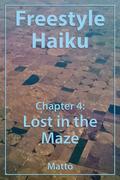95 poems by Monk Matto (written between July 2011 and July 2012) "The Spring and all it's beauty had passed, and in it's place I found an increasingly troubled mind. The relationship I had so strongly yearned for had broken apart, I faced wave after wave of layoffs where I saw my friends leave, and the home I thought I found started to feel flimsy. These challenges affected my words, as well as my productivity. I wrote far fewer poems in this time; a few less than 100 poems over the course of an entire year." -Matto About This Poetry Matto's short poems may not seem like haiku, because they do not follow the traditional form that many readers might expect. These haiku are written in a free-verse style, that Matto calls Freestyle Haiku. He discovered the possibility of this more freeing style of haiku from the writings of the Zen priest, Santoka Teneda (1882-1940). He wandered and traveled during the later years of his life while writing haiku. Matto enjoy's writing Freestyle Haiku, because it allows him to express abstract and powerful feelings in only a few words, free from a mandated structure. The words on his page are the most direct crystallization of his feelings and experiences, and the brevity of haiku draws attention to the exact words he chooses. A meaning-rich haiku can be challenging to read; treating one like prose will leave it flat. The goal of a haiku is often to conjure up something beyond the words and their individual meanings. The reader must add themselves to the poem, to experience the words in the way they're presented, to try and feel the poem. A good haiku will leave the reader with an experience. About the Author Monk Matto: poet, author, photographer, filmmaker, artist, inventor, teacher, engineer, carpenter, producer, entrepreneur, spiritualist, martial artist, Chimera wrestler, and Jedi Knight. .Ok, maybe those last two are only true in a figurative sense. Monk Matto lives in the Washington D.C. area, and enjoys cruising around


